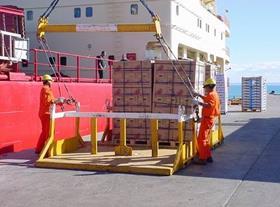
Shipments of Argentinean fresh fruits and vegetables from the Ports of San Antonio and Bahía Blanca have fallen by 37.66 per cent to 175,707 tonnes up to 15 April, compared with the year-earlier period result of 281,840 tonnes.
Export declines were recorded across all categories including apples, cherries, peaches, pears, plums, pumpkin, nectarines, onions and table grapes, according to figures released by the Patagonia Norte Port Terminal, which operates the two ports.
Apple and pear sendings fell by 41.6 per cent to 36,369 tonnes and 35,26 per cent to 1,309 tonnes respectively, the data indicated.
In the stonefruit category, sendings of cherries, nectarines and peaches fell by 100 per cent to zero, while plums declined by 81.97 per cent to 176 tonnes.
The records from Patagonia Norte show that table grape exports also contracted to 1,309 tonnes, down 31.5 per cent on 1,911 tonnes in 2011.
Additionally, shipments of pumpkins fell to zero following a 178-tonne shipment in 2011, while onions declined by 65.83 per cent to 2,337 tonnes.
Argentina’s produce exports fell to most of its markets around the world during the period, except Bulgaria, Canada, Egypt, Ireland, Lebanon, Libya, Norway, Oman, Qatar and Turkey, according to the port’s records.
Sendings have fallen to most of Argentina’s biggest markets, including Italy, the Netherlands, Russia and the US, whose arrivals have declined by -43.28 per cent (to 24,332 tonnes), -53.52 per cent (to 29,061 tonnes); -35.25 per cent (to 53,054 tonnes) and -13.56 per cent (to 25,613 tonnes).
Argentinean produce suppliers are struggling with a lack of competitiveness on the international market due to high inflation, which has pushed up the cost of labour and materials.
The situation has led to a contraction in exports across the country’s fruit and vegetable category this season, including blueberries.






No comments yet